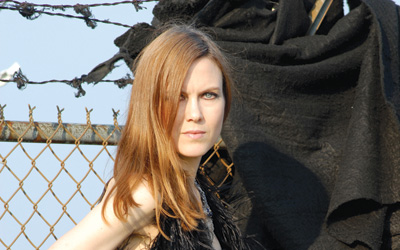 JULIANA HATFIELD
JULIANA HATFIELD
Alt-rocker strips down old school—and finds peace
Juliana Hatfield’s 2008 album How to Walk Away was a polished effort, recorded in a New York City studio over a long time with a large cast of musicians. For her latest, Peace and Love, she elected to take precisely the opposite tack.
“This time I wanted to be alone,” she says. “I wanted to see what would come out of me with no one else involved.” Writing and recording at home on an analog eight-track recorder, Hatfield came up with a ballad-driven song cycle centered on strummed guitars, delicate vocal harmonies and introspective themes. The lack of production gloss only serves to emphasize her exquisite way with a melody—a gift Hatfield attributes to the impact AM radio had on her when she was growing up. “I fell madly in love with ’70s pop songs at a time when I was very impressionable,” she says. “I loved Fleetwood Mac, the Eagles, Seals & Crofts, America—songs that everyone knows. That music really got into my bloodstream and my psyche.”
While the bulk of Peace and Love is spare and acoustic guitar-based, Hatfield does paint outside the lines on occasion. The piano ballad “Why Can’t We Love Each Other” is the first song she’s ever written on keyboard, while the hot-wired, Neil Young-like electric guitar break in “What Is Wrong” provides the disc with its only plugged-in moment. “There was a period a few years ago when I hunkered down and worked really hard on guitar, learning things like Keith Richards solos in weird tunings,” Hatfield says of her approach to the six-string. “I spent about a year doing that, learning how to do certain scales and so forth. But other than that, I’ve been a slacker—although I care very much about my guitar playing. I think one of the reasons I never studied it very much is that I wanted to keep it pure. I didn’t want to be influenced by other guitarists.”
It’s been more than two decades since Hatfield first made her name as part of the cult-beloved trio Blake Babies. She eclipsed that group’s success as leader of the Juliana Hatfield Three with early-1990s modern-rock hits like “My Sister” and “Spin the Bottle” before going completely solo in 1995. She says she’s only now begun to consider the musical legacy she has built during her career.
“Some of my old records make me cringe,” she admits, “but everything about them was very innocent and very pure. My body of work has integrity, in the sense that I never tried to tailor anything to anyone else’s tastes or to the marketplace. I have nothing to be ashamed of, that’s for sure.”
–Russell Hall
Jan/Feb 2010 Issue of M Music & Musicians



comment closed